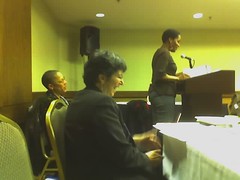 Nedra Bickham moderated the panel on Langston Hughes' translations, introducing the poet with a recording of "Weary Blues", a brief overview of Hughes' life, and a quote from Edna St. Vincent Millay about poets as translators vs. another quote from Ruben Dario about non-poets translating poetry.
Nedra Bickham moderated the panel on Langston Hughes' translations, introducing the poet with a recording of "Weary Blues", a brief overview of Hughes' life, and a quote from Edna St. Vincent Millay about poets as translators vs. another quote from Ruben Dario about non-poets translating poetry.Nancy Festinger talked about Hughes and Nicolas Guillen, blowing me away with her fiesty trash-talking reading of "Búcate plata", one of the first poems in Afro-Cuban dialect ever published. We talked about how that poem might be translated differently today, and Nancy pointed out particularly that "mi negro" was a general endearment, like saying honey, baby, or sweetie; not really a racial epithet. I enjoyed the poem "Llegada" very much; Nancy provided Hughes' translation and one by Roberto Marquez and David Arthur MacMurray.
Tanyika Carey also quoted Millay more extensively, poetry translation being "as complicated as blood transfusion". She talked about the difference between the Pan-Africanism and negritude movements, and then gave us a fascinating glimpse of Haitian poets Jean-Joseph Rabéarivelo and Jacques Roumain , and Hughes' relationships with them & translations of their work, along with a poem to Hughes by Roumain.
I talked about Hughes' translations of Gabriela Mistral, and how his translations and interpretations were gendered; positioning Mistral as a populist everywoman, as "essentially feminine" or as a cosmic mother singing a simple lullaby. The Nobel at the close of WWII; construction of the myth of the earth mother healing the world's wounds. Hughes extending his own populist project to gender, that what he felt was essentially woman-like should be heard. Critics praised the ways Hughes made Mistral's poetry "sound like a woman's work". Mistral was deeply engaged with Latin American and European intellectual/aesthetic/poetic currents - for example, in dialogue with modernismo. Then I gave a specific example of the short poem "Rocío", reading the Spanish, a very bad translation by someone named Cristopher, Hughes' beautiful and poetic translation, but then I critiqued Hughes' reading of the "dew" and miracle as an infant son - not, as in my reading, of breast milk itself. This as an example of ways that gender-influenced mistranslations can influence the interestingness of poems and subsequent canonization or relative erasure of a writer's work. (I mentioned Mistral's dismaying and complicated racism, but didn't elaborate. If anyone is interested in this, look at her letters and essays after her adopted son killed himself.)
It was a lively panel that put out a ton of information and ideas. I had fun with it and enjoyed the opportunity to learn about Langston Hughes over the last few months of preparation with my fellow panelists.
Technorati Tags: international, literature, poetry, translation

No comments:
Post a Comment